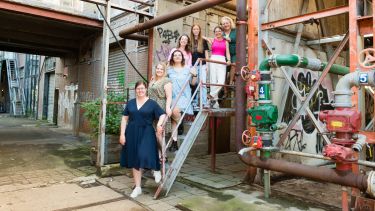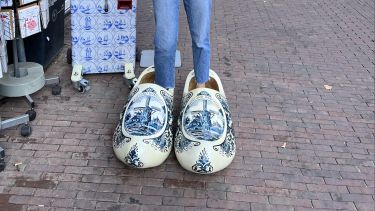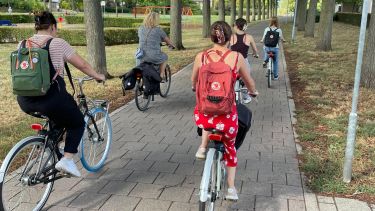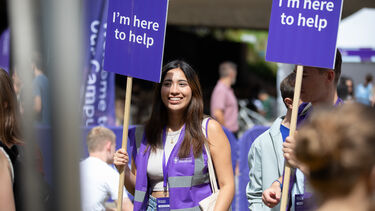Alice Willett: "I have been in the Netherlands now for over two months and time has really gone in the blink of an eye. Going on my year abroad is the first time that I have travelled alone and had to get a flight without my mum keeping guard of my passport, so itās safe to say that I was quite nervous.
I am living in a house with a lady and her partner. We share the kitchen and bathroom so I hit the ground running with speaking Dutch. I have only spoken Dutch with Hanne and her partner, which in the first few weeks was exhausting, but now I can have a conversation without having to think too hard about how I can say what I want to. Speaking Dutch now feels a lot more normal and especially with Hanne I think it would actually feel weird if we spoke in English.
Teaching is also something I have considered for after university so I really value being able to gain experience of teaching classes.
Alice Willett
Since being here I have been working with Such Fun, a programme that offers Early English tuition in the Netherlands. I work in four different primary schools in Den Bosch and teach English to children aged 4-12. I definitely have a new appreciation for teachers! While it is tiring, it is incredibly fun and it really makes your day hearing a little chorus of āthank you Miss Aliceā at the end of a lesson. Teaching is also something I have considered for after university so I really value being able to gain experience of teaching classes. It is also very rewarding seeing the children improve and knowing that you are a part of that.
As well as teaching with Such Fun, Poppy and I have been doing a German course with Radboud University in Nijmegen. It is very intense but we are both studying in Germany next semester so itās good to be exposed to some German while being here. It was also really nice to be involved in the University's Orientation Week and I got to meet people from all over the world while getting to explore Nijmegen.
Alice's top tips:
1. Get an OV Chipkaart. This means that you can travel on any train in the Netherlands for free on a weekend. During off peak hours in the week you ā and anyone travelling with you! ā get 40% discount, so it is definitely worthwhile. Since having the OV Chipkaart and weekend deal I have visited one or two new cities a week. Iāve been to Dordrecht, Utrecht, Delft, Rotterdam, Zwolle and Tiel so far. Last weekend I even ventured as far as Texe,l which is about as far away as you can go from Den Bosch in the Netherlands, but it is a beautiful island and I would definitely recommend a visit.
2. Get a Dutch bank account. You will need one to get the OV Chipkaart. I would recommend BUNQ. It is an online bank (a bit like Revolut or Monzo) and takes about 15 minutes to set up. You need a BSN number to set it up, so I would recommend getting your appointment to register your address with your local City Council as soon as possible.
3. Get a bike. I was terrified of cycling! but after two months I feel almost like a pro! I will hand over to Poppy who also has a host of tips for you."
Poppy's top tips on cycling
Poppy Mainwaring: "When moving to the Low Countries, one of the most important things to think about is cycling. It can feel quite overwhelming when you arrive, seeing all the Dutch people on their bikes, making cycling look as easy as breathing. Youāll think: āHow the hell am I meant to do that?!ā But as scary as it may feel, joining in with fietscultuur is a massive and important part of your time here.
1. Try to ride a bike a little bit before you leave: borrow one from a friend, rent one for a day in the Peak District. Just get used to staying upright.
2. Try and arrange to have your bike within the first couple of days of arrival. Services such as swapfiets, a lease-a-bike-scheme, are amazing as they ensure you always have a working bike. Around the start of the semester they are often oversubscribed, so order your bike early to get cycling as soon as possible.
3. The saddle of your bike should be at about hip height. This means you wonāt hurt your knees when cycling, and if the saddle is at the right height youāll be able to cycle faster. It can feel a little scary at first though, because your feet will only just be able to touch the ground.
4. Practise cycling on the cycle lanes before you cycle in the city centre. The city centres can be busy, with a lot of pedestrians to swerve around, cobble stones, and other vehicles that can be super unpredictable. When cycling on the fietspaden (cycle lanes), you only have other bikes to worry about.
Even if you donāt feel confident, try and cycle as though you know what youāre doing.
Poppy Mainwaring
5. Read up on cycle rules. Theyāre pretty basic, and people donāt always follow them, but theyāre good to know, and some can result in hefty fines. is a good resource.
6. Invest in a bicycle phone holder. You can buy them for about 3 euros in 'Action' or 'So Low', and it saves a lot of hassle as you donāt have to keep stopping to check maps. Holding your phone while cycling is also illegal, so having a phone holder removes the risk of the fine.
7. Invest in some bicycle bags and luggage straps. This makes carrying shopping home from the supermarket much easier, and it means you donāt have to deal with a sweaty back from cycling with a rucksack on. It also makes your bike more unique so you can spot it more easily.
8. Use google maps over other maps. Google maps shows cycle lanes and the best cycle routes, where apple maps (and other map services) do not.
9. Get waterproofs. It rains here. A lot. And cycling in the rain is unpleasant. Get a decent waterproof coat (and some trousers if you can), always keep a poncho (which are about 75 cents) in your bike bags, and get a waterproof saddle cover.
10. Expect to get saddle sores. Not everyone gets them, but theyāre likely to happen if you havenāt ridden a bike much before. Invest in a saddle cushion (theyāre usually 5-10 euros), and some Sudocrem.
All these things will make your assimilation into Dutch fietscultuur a little easier. Even if you donāt feel confident, try and cycle as though you know what youāre doing. Trust that the Dutch are good enough cyclists to swerve round you if youāre a bit wobbly, and trust me when I say it gets a little easier every day.
Heeeeel veel sterkte, and have fun cycling!"
Poppy




